Abstract
It has been generally accepted that transforming growth factor beta1 (TGF-beta1) has both negative and positive effects on tumour growth and progression. This study analysed the prognostic value of TGF-beta1 mRNA in advanced gastric carcinoma. A reverse transcriptase-polymerase chain reaction analysis (RT-PCR) was used for TGF-beta1 in endoscopic biopsy specimens from 42 advanced gastric carcinomas. Thirty specimens expressed TGF-beta1 mRNA while 12 specimens did not. The follow-up duration ranged from 4 to 37 months (mean 22.8 months). TGF-beta1-positive group demonstrated a shorter overall survival compared with the TGF-beta1 -negative group (P=0.0014). A significant correlation was also found in the 32 patients who underwent curative resection (P=0.0048). Significant correlations were found between TGF-beta1 mRNA expression and both stage (P=0.0015) and nodal involvement (P=0.0060). Multivariate analysis demonstrated that only TGF-beta1 mRNA expression (P=0.0306) was an independent prognostic factor. All of ten patients who underwent non-curative resection expressed TGF-beta1 mRNA. Expression of TGF-beta1 mRNA in gastric biopsy specimens may be an important preoperative prognostic variable for advanced gastric carcinoma.
Full text
PDF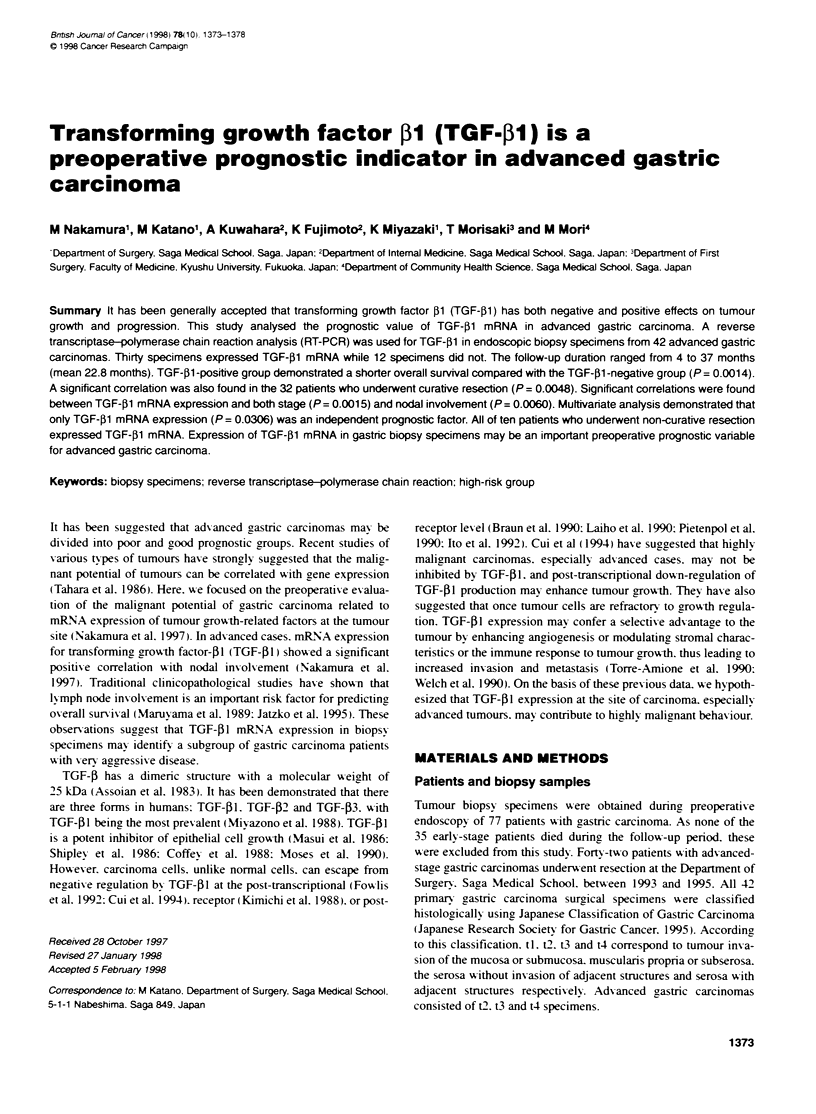
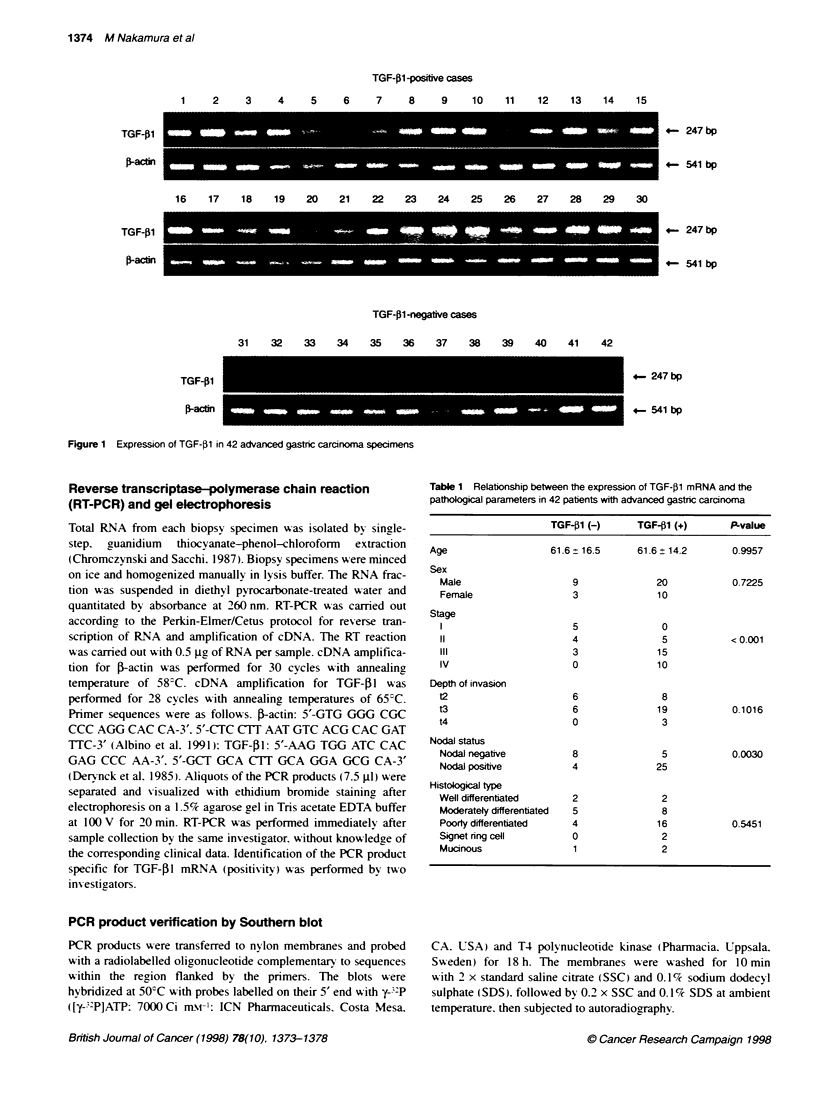
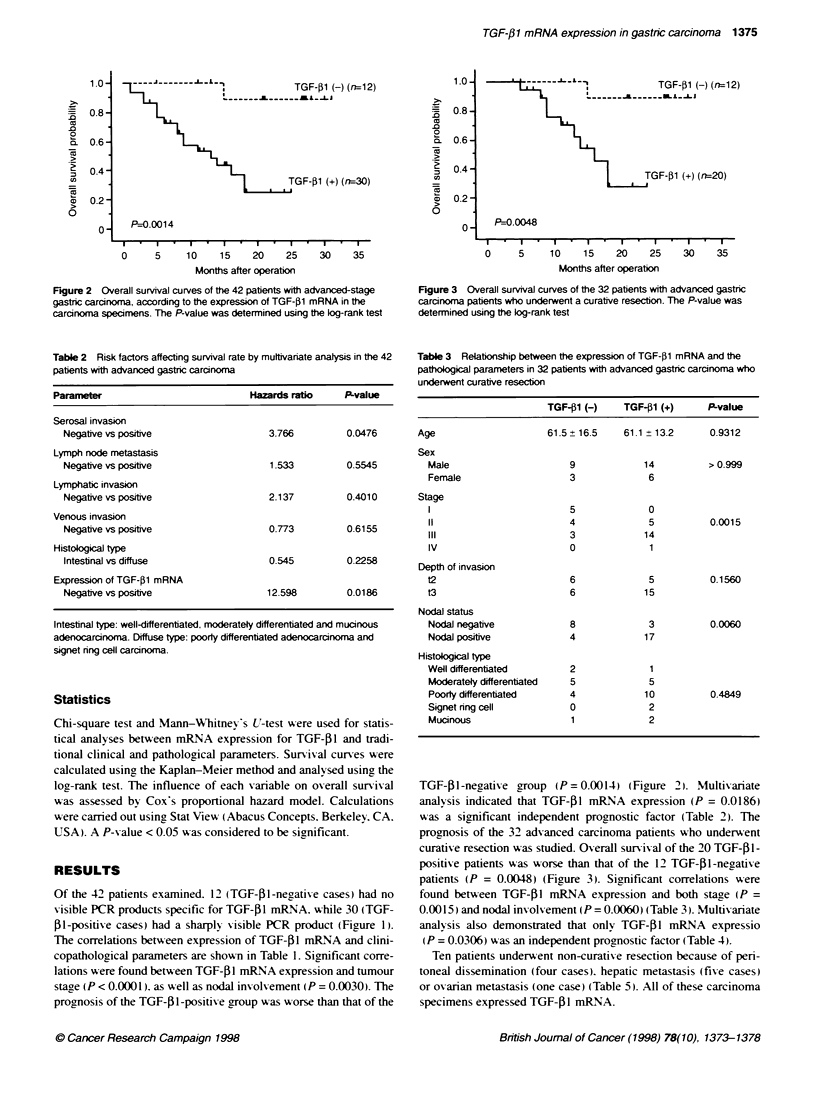
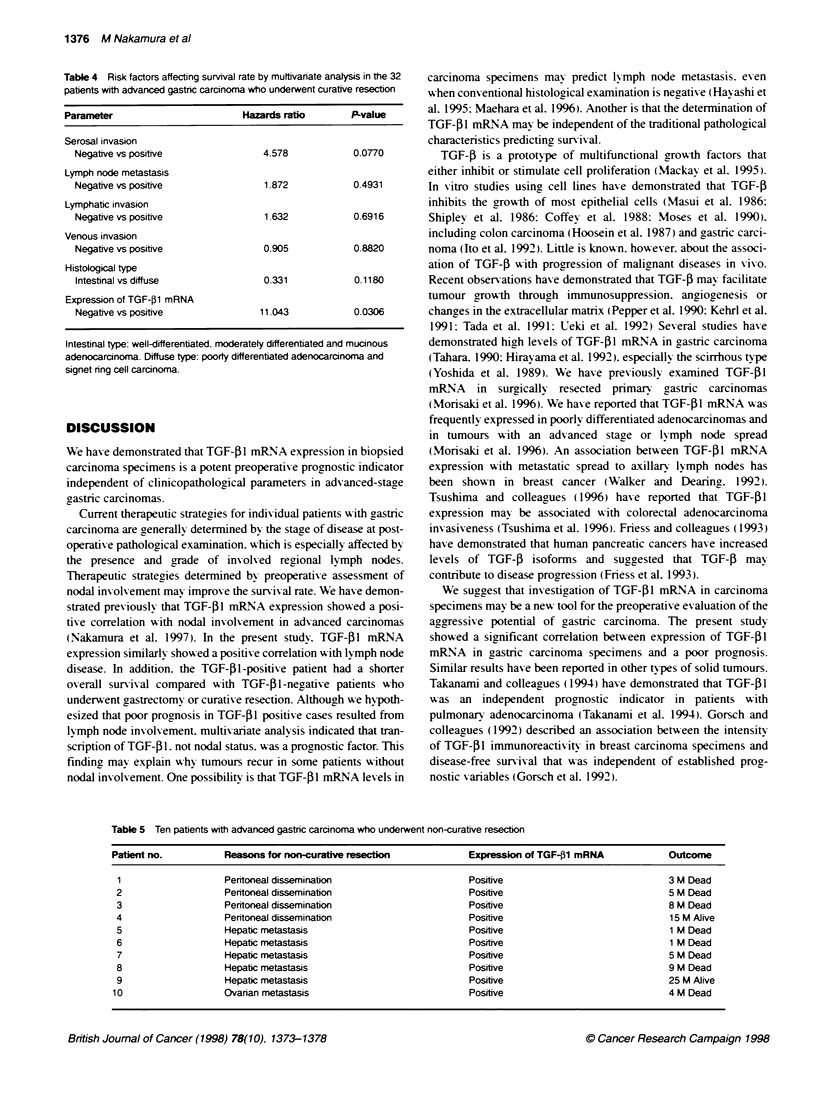
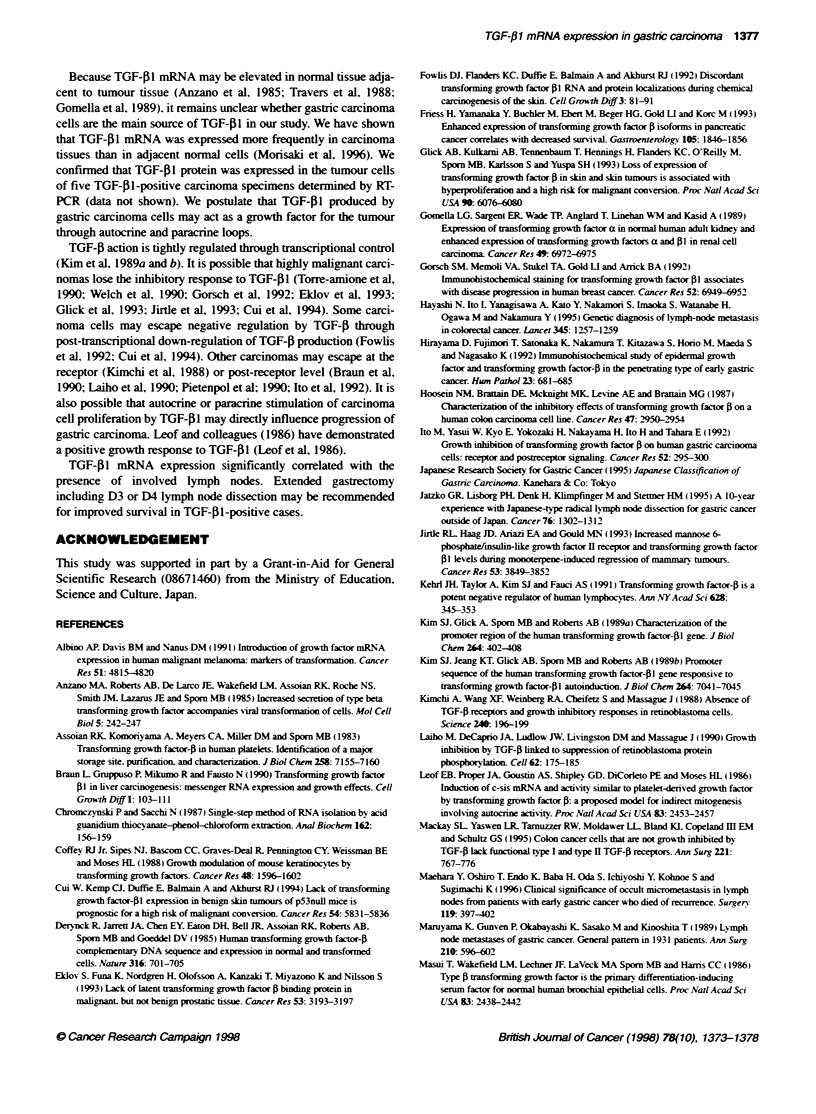

Images in this article
Selected References
These references are in PubMed. This may not be the complete list of references from this article.
- Albino A. P., Davis B. M., Nanus D. M. Induction of growth factor RNA expression in human malignant melanoma: markers of transformation. Cancer Res. 1991 Sep 15;51(18):4815–4820. [PubMed] [Google Scholar]
- Anzano M. A., Roberts A. B., De Larco J. E., Wakefield L. M., Assoian R. K., Roche N. S., Smith J. M., Lazarus J. E., Sporn M. B. Increased secretion of type beta transforming growth factor accompanies viral transformation of cells. Mol Cell Biol. 1985 Jan;5(1):242–247. doi: 10.1128/mcb.5.1.242. [DOI] [PMC free article] [PubMed] [Google Scholar]
- Assoian R. K., Komoriya A., Meyers C. A., Miller D. M., Sporn M. B. Transforming growth factor-beta in human platelets. Identification of a major storage site, purification, and characterization. J Biol Chem. 1983 Jun 10;258(11):7155–7160. [PubMed] [Google Scholar]
- Braun L., Gruppuso P., Mikumo R., Fausto N. Transforming growth factor beta 1 in liver carcinogenesis: messenger RNA expression and growth effects. Cell Growth Differ. 1990 Mar;1(3):103–111. [PubMed] [Google Scholar]
- Chomczynski P., Sacchi N. Single-step method of RNA isolation by acid guanidinium thiocyanate-phenol-chloroform extraction. Anal Biochem. 1987 Apr;162(1):156–159. doi: 10.1006/abio.1987.9999. [DOI] [PubMed] [Google Scholar]
- Coffey R. J., Jr, Sipes N. J., Bascom C. C., Graves-Deal R., Pennington C. Y., Weissman B. E., Moses H. L. Growth modulation of mouse keratinocytes by transforming growth factors. Cancer Res. 1988 Mar 15;48(6):1596–1602. [PubMed] [Google Scholar]
- Cui W., Kemp C. J., Duffie E., Balmain A., Akhurst R. J. Lack of transforming growth factor-beta 1 expression in benign skin tumors of p53null mice is prognostic for a high risk of malignant conversion. Cancer Res. 1994 Nov 15;54(22):5831–5836. [PubMed] [Google Scholar]
- Derynck R., Jarrett J. A., Chen E. Y., Eaton D. H., Bell J. R., Assoian R. K., Roberts A. B., Sporn M. B., Goeddel D. V. Human transforming growth factor-beta complementary DNA sequence and expression in normal and transformed cells. Nature. 1985 Aug 22;316(6030):701–705. doi: 10.1038/316701a0. [DOI] [PubMed] [Google Scholar]
- Eklöv S., Funa K., Nordgren H., Olofsson A., Kanzaki T., Miyazono K., Nilsson S. Lack of the latent transforming growth factor beta binding protein in malignant, but not benign prostatic tissue. Cancer Res. 1993 Jul 1;53(13):3193–3197. [PubMed] [Google Scholar]
- Fowlis D. J., Flanders K. C., Duffie E., Balmain A., Akhurst R. J. Discordant transforming growth factor beta 1 RNA and protein localization during chemical carcinogenesis of the skin. Cell Growth Differ. 1992 Feb;3(2):81–91. [PubMed] [Google Scholar]
- Friess H., Yamanaka Y., Büchler M., Ebert M., Beger H. G., Gold L. I., Korc M. Enhanced expression of transforming growth factor beta isoforms in pancreatic cancer correlates with decreased survival. Gastroenterology. 1993 Dec;105(6):1846–1856. doi: 10.1016/0016-5085(93)91084-u. [DOI] [PubMed] [Google Scholar]
- Glick A. B., Kulkarni A. B., Tennenbaum T., Hennings H., Flanders K. C., O'Reilly M., Sporn M. B., Karlsson S., Yuspa S. H. Loss of expression of transforming growth factor beta in skin and skin tumors is associated with hyperproliferation and a high risk for malignant conversion. Proc Natl Acad Sci U S A. 1993 Jul 1;90(13):6076–6080. doi: 10.1073/pnas.90.13.6076. [DOI] [PMC free article] [PubMed] [Google Scholar]
- Gomella L. G., Sargent E. R., Wade T. P., Anglard P., Linehan W. M., Kasid A. Expression of transforming growth factor alpha in normal human adult kidney and enhanced expression of transforming growth factors alpha and beta 1 in renal cell carcinoma. Cancer Res. 1989 Dec 15;49(24 Pt 1):6972–6975. [PubMed] [Google Scholar]
- Gorsch S. M., Memoli V. A., Stukel T. A., Gold L. I., Arrick B. A. Immunohistochemical staining for transforming growth factor beta 1 associates with disease progression in human breast cancer. Cancer Res. 1992 Dec 15;52(24):6949–6952. [PubMed] [Google Scholar]
- Hayashi N., Ito I., Yanagisawa A., Kato Y., Nakamori S., Imaoka S., Watanabe H., Ogawa M., Nakamura Y. Genetic diagnosis of lymph-node metastasis in colorectal cancer. Lancet. 1995 May 20;345(8960):1257–1259. doi: 10.1016/s0140-6736(95)90922-2. [DOI] [PubMed] [Google Scholar]
- Hirayama D., Fujimori T., Satonaka K., Nakamura T., Kitazawa S., Horio M., Maeda S., Nagasako K. Immunohistochemical study of epidermal growth factor and transforming growth factor-beta in the penetrating type of early gastric cancer. Hum Pathol. 1992 Jun;23(6):681–685. doi: 10.1016/0046-8177(92)90325-w. [DOI] [PubMed] [Google Scholar]
- Ito M., Yasui W., Kyo E., Yokozaki H., Nakayama H., Ito H., Tahara E. Growth inhibition of transforming growth factor beta on human gastric carcinoma cells: receptor and postreceptor signaling. Cancer Res. 1992 Jan 15;52(2):295–300. [PubMed] [Google Scholar]
- Jatzko G. R., Lisborg P. H., Denk H., Klimpfinger M., Stettner H. M. A 10-year experience with Japanese-type radical lymph node dissection for gastric cancer outside of Japan. Cancer. 1995 Oct 15;76(8):1302–1312. doi: 10.1002/1097-0142(19951015)76:8<1302::aid-cncr2820760803>3.0.co;2-8. [DOI] [PubMed] [Google Scholar]
- Jirtle R. L., Haag J. D., Ariazi E. A., Gould M. N. Increased mannose 6-phosphate/insulin-like growth factor II receptor and transforming growth factor beta 1 levels during monoterpene-induced regression of mammary tumors. Cancer Res. 1993 Sep 1;53(17):3849–3852. [PubMed] [Google Scholar]
- Kehrl J. H., Taylor A., Kim S. J., Fauci A. S. Transforming growth factor-beta is a potent negative regulator of human lymphocytes. Ann N Y Acad Sci. 1991;628:345–353. doi: 10.1111/j.1749-6632.1991.tb17267.x. [DOI] [PubMed] [Google Scholar]
- Kim S. J., Glick A., Sporn M. B., Roberts A. B. Characterization of the promoter region of the human transforming growth factor-beta 1 gene. J Biol Chem. 1989 Jan 5;264(1):402–408. [PubMed] [Google Scholar]
- Kim S. J., Jeang K. T., Glick A. B., Sporn M. B., Roberts A. B. Promoter sequences of the human transforming growth factor-beta 1 gene responsive to transforming growth factor-beta 1 autoinduction. J Biol Chem. 1989 Apr 25;264(12):7041–7045. [PubMed] [Google Scholar]
- Kimchi A., Wang X. F., Weinberg R. A., Cheifetz S., Massagué J. Absence of TGF-beta receptors and growth inhibitory responses in retinoblastoma cells. Science. 1988 Apr 8;240(4849):196–199. doi: 10.1126/science.2895499. [DOI] [PubMed] [Google Scholar]
- Laiho M., DeCaprio J. A., Ludlow J. W., Livingston D. M., Massagué J. Growth inhibition by TGF-beta linked to suppression of retinoblastoma protein phosphorylation. Cell. 1990 Jul 13;62(1):175–185. doi: 10.1016/0092-8674(90)90251-9. [DOI] [PubMed] [Google Scholar]
- Leof E. B., Proper J. A., Goustin A. S., Shipley G. D., DiCorleto P. E., Moses H. L. Induction of c-sis mRNA and activity similar to platelet-derived growth factor by transforming growth factor beta: a proposed model for indirect mitogenesis involving autocrine activity. Proc Natl Acad Sci U S A. 1986 Apr;83(8):2453–2457. doi: 10.1073/pnas.83.8.2453. [DOI] [PMC free article] [PubMed] [Google Scholar]
- Maehara Y., Oshiro T., Endo K., Baba H., Oda S., Ichiyoshi Y., Kohnoe S., Sugimachi K. Clinical significance of occult micrometastasis lymph nodes from patients with early gastric cancer who died of recurrence. Surgery. 1996 Apr;119(4):397–402. doi: 10.1016/s0039-6060(96)80138-3. [DOI] [PubMed] [Google Scholar]
- Maruyama K., Gunvén P., Okabayashi K., Sasako M., Kinoshita T. Lymph node metastases of gastric cancer. General pattern in 1931 patients. Ann Surg. 1989 Nov;210(5):596–602. doi: 10.1097/00000658-198911000-00005. [DOI] [PMC free article] [PubMed] [Google Scholar]
- Masui T., Wakefield L. M., Lechner J. F., LaVeck M. A., Sporn M. B., Harris C. C. Type beta transforming growth factor is the primary differentiation-inducing serum factor for normal human bronchial epithelial cells. Proc Natl Acad Sci U S A. 1986 Apr;83(8):2438–2442. doi: 10.1073/pnas.83.8.2438. [DOI] [PMC free article] [PubMed] [Google Scholar]
- Miyazono K., Hellman U., Wernstedt C., Heldin C. H. Latent high molecular weight complex of transforming growth factor beta 1. Purification from human platelets and structural characterization. J Biol Chem. 1988 May 5;263(13):6407–6415. [PubMed] [Google Scholar]
- Morisaki T., Katano M., Ikubo A., Anan K., Nakamura M., Nakamura K., Sato H., Tanaka M., Torisu M. Immunosuppressive cytokines (IL-10, TGF-beta) genes expression in human gastric carcinoma tissues. J Surg Oncol. 1996 Dec;63(4):234–239. doi: 10.1002/(SICI)1096-9098(199612)63:4<234::AID-JSO4>3.0.CO;2-D. [DOI] [PubMed] [Google Scholar]
- Moses H. L., Yang E. Y., Pietenpol J. A. TGF-beta stimulation and inhibition of cell proliferation: new mechanistic insights. Cell. 1990 Oct 19;63(2):245–247. doi: 10.1016/0092-8674(90)90155-8. [DOI] [PubMed] [Google Scholar]
- Nakamura M., Katano M., Fujimoto K., Morisaki T. A new prognostic strategy for gastric carcinoma: mRNA expression of tumor growth-related factors in endoscopic biopsy specimens. Ann Surg. 1997 Jul;226(1):35–42. doi: 10.1097/00000658-199707000-00005. [DOI] [PMC free article] [PubMed] [Google Scholar]
- Pepper M. S., Belin D., Montesano R., Orci L., Vassalli J. D. Transforming growth factor-beta 1 modulates basic fibroblast growth factor-induced proteolytic and angiogenic properties of endothelial cells in vitro. J Cell Biol. 1990 Aug;111(2):743–755. doi: 10.1083/jcb.111.2.743. [DOI] [PMC free article] [PubMed] [Google Scholar]
- Pietenpol J. A., Stein R. W., Moran E., Yaciuk P., Schlegel R., Lyons R. M., Pittelkow M. R., Münger K., Howley P. M., Moses H. L. TGF-beta 1 inhibition of c-myc transcription and growth in keratinocytes is abrogated by viral transforming proteins with pRB binding domains. Cell. 1990 Jun 1;61(5):777–785. doi: 10.1016/0092-8674(90)90188-k. [DOI] [PubMed] [Google Scholar]
- Shipley G. D., Pittelkow M. R., Wille J. J., Jr, Scott R. E., Moses H. L. Reversible inhibition of normal human prokeratinocyte proliferation by type beta transforming growth factor-growth inhibitor in serum-free medium. Cancer Res. 1986 Apr;46(4 Pt 2):2068–2071. [PubMed] [Google Scholar]
- Tada T., Ohzeki S., Utsumi K., Takiuchi H., Muramatsu M., Li X. F., Shimizu J., Fujiwara H., Hamaoka T. Transforming growth factor-beta-induced inhibition of T cell function. Susceptibility difference in T cells of various phenotypes and functions and its relevance to immunosuppression in the tumor-bearing state. J Immunol. 1991 Feb 1;146(3):1077–1082. [PubMed] [Google Scholar]
- Tahara E. Growth factors and oncogenes in human gastrointestinal carcinomas. J Cancer Res Clin Oncol. 1990;116(2):121–131. doi: 10.1007/BF01612665. [DOI] [PubMed] [Google Scholar]
- Tahara E., Sumiyoshi H., Hata J., Yasui W., Taniyama K., Hayashi T., Nagae S., Sakamoto S. Human epidermal growth factor in gastric carcinoma as a biologic marker of high malignancy. Jpn J Cancer Res. 1986 Feb;77(2):145–152. [PubMed] [Google Scholar]
- Takanami I., Imamura T., Hashizume T., Kikuchi K., Yamamoto Y., Kodaira S. Transforming growth factor beta 1 as a prognostic factor in pulmonary adenocarcinoma. J Clin Pathol. 1994 Dec;47(12):1098–1100. doi: 10.1136/jcp.47.12.1098. [DOI] [PMC free article] [PubMed] [Google Scholar]
- Torre-Amione G., Beauchamp R. D., Koeppen H., Park B. H., Schreiber H., Moses H. L., Rowley D. A. A highly immunogenic tumor transfected with a murine transforming growth factor type beta 1 cDNA escapes immune surveillance. Proc Natl Acad Sci U S A. 1990 Feb;87(4):1486–1490. doi: 10.1073/pnas.87.4.1486. [DOI] [PMC free article] [PubMed] [Google Scholar]
- Travers M. T., Barrett-Lee P. J., Berger U., Luqmani Y. A., Gazet J. C., Powles T. J., Coombes R. C. Growth factor expression in normal, benign, and malignant breast tissue. Br Med J (Clin Res Ed) 1988 Jun 11;296(6637):1621–1624. doi: 10.1136/bmj.296.6637.1621. [DOI] [PMC free article] [PubMed] [Google Scholar]
- Tsushima H., Kawata S., Tamura S., Ito N., Shirai Y., Kiso S., Imai Y., Shimomukai H., Nomura Y., Matsuda Y. High levels of transforming growth factor beta 1 in patients with colorectal cancer: association with disease progression. Gastroenterology. 1996 Feb;110(2):375–382. doi: 10.1053/gast.1996.v110.pm8566583. [DOI] [PubMed] [Google Scholar]
- Ueki N., Nakazato M., Ohkawa T., Ikeda T., Amuro Y., Hada T., Higashino K. Excessive production of transforming growth-factor beta 1 can play an important role in the development of tumorigenesis by its action for angiogenesis: validity of neutralizing antibodies to block tumor growth. Biochim Biophys Acta. 1992 Oct 27;1137(2):189–196. doi: 10.1016/0167-4889(92)90201-l. [DOI] [PubMed] [Google Scholar]
- Walker R. A., Dearing S. J. Transforming growth factor beta 1 in ductal carcinoma in situ and invasive carcinomas of the breast. Eur J Cancer. 1992;28(2-3):641–644. doi: 10.1016/s0959-8049(05)80116-9. [DOI] [PubMed] [Google Scholar]
- Welch D. R., Fabra A., Nakajima M. Transforming growth factor beta stimulates mammary adenocarcinoma cell invasion and metastatic potential. Proc Natl Acad Sci U S A. 1990 Oct;87(19):7678–7682. doi: 10.1073/pnas.87.19.7678. [DOI] [PMC free article] [PubMed] [Google Scholar]
- Welch R. D., Auer J. A., Watkins J. P., Baird A. N. Surgical treatment of tarsal sheath effusion associated with an exostosis on the calcaneus of a horse. J Am Vet Med Assoc. 1990 Jun 15;196(12):1992–1994. [PubMed] [Google Scholar]
- Yoshida K., Yokozaki H., Niimoto M., Ito H., Ito M., Tahara E. Expression of TGF-beta and procollagen type I and type III in human gastric carcinomas. Int J Cancer. 1989 Sep 15;44(3):394–398. doi: 10.1002/ijc.2910440303. [DOI] [PubMed] [Google Scholar]



